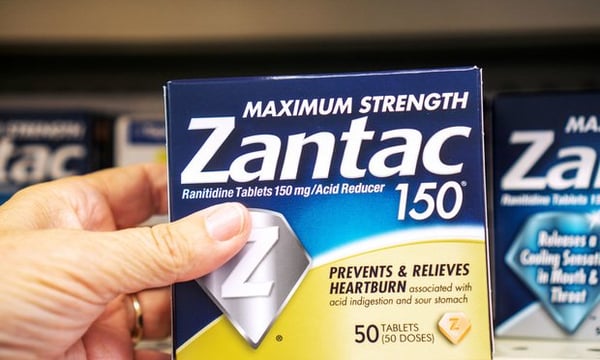

On September 13th of 2019, the Food and Drug Administration (FDA) found that Zantac and its generic counterparts contained some levels of a probable carcinogen called N-nitrosodimethlylamine (NDMA). As a result, major drug stores like CVS pharmacy and Walgreens have taken Zantac and its generic counterparts (ranitidine) off their shelves to protect consumers. This was done as a directive by the FDA and Zantac will be off the shelves until further notice. Major drug corporations like Sandoz and Apotex have recalled all of their generic counterparts from all U.S. stores.
What Do We Know About Ranitidine Zantac?
Zantac is the brand name for Ranitidine and it’s a common medication used for heart burn relief. Zantac and its generic counterparts are available by prescription but can also be purchased over-the-counter. The drug works by decreasing the amount of acid the stomach creates. Although several different drug manufacturers sell the generic versions, Zantac was manufactured and is distributed by Sanofi - a drugmaker with a long laundry list of dangerous drugs that have resulted in lawsuits.
Zantac Leads to Health Issues
Serious Side Effects
- Fast or slow heartbeats
- Coughing up yellow & green mucus
- Vision complications and yellowing of the eyes
- Dark urine & clay-colored stools
What Cancers Has Zantac Been Linked to?
- Pancreatic Cancer
- Bladder Cancer
- Stomach & Gastric Cancer
- Colon & Intestinal Cancer
- Kidney Cancer
What Do We Know About NDMA?
Exposure to NDMA is perhaps the most concerning health threat. N-nitrosodimethlylamine or NDMA was originally used to produce rocket fuel. In fact, rocket manufacturers halted the use of NDMA because they found that the substance was contaminating the water, air, and soil near their fuel manufacturing plants. The Environmental Protection Agency (EPA) labelled NDMA a probable human carcinogen - a substance that can cause cancer. Furthermore, through animal studies, the EPA also found NDMA to be extremely harmful to the livers of their test subjects.
The FDA has labeled Zantac as having “potentially cancer-causing impurities.” This has led to multiple recalls beyond that of Zantac, including Valsartan, a fairly common medication used to treat blood pressure. As of right now, it is unclear what the scale and permanency of the damages caused by Zantac really are. The FDA is currently working with several international firms to review the medications and to determine the level of health risks posed by Zantac’s impurities.
The FDA has directed the manufacturers of Zantac to perform tests on their individual products and to send samples in for further examinations. This directive also umbrellas all manufacturers of Ranitidine, the generic counterparts of Zantac.
Here’s What You Need to Know
People who have regularly used Zantac or ranitidine products to treat their heartburn, ulcers, and/or gastrointestinal reflux disease (GERD) are at risk of carcinogen exposure. Zantac and ranitidine products are intended for short-term use, however, many have turned to Zantac as their long-term heartburn remedy. Individuals who have used Zantac and/or ranitidine products substantially should consult with their health care provider about the potential side-effects of their long-term use. We believe more information will soon be available to the public as the FDA and other regulatory agencies continue their investigations.
Users of Zantac & Ranitidine Products Should Know
- Not all ranitidine products have been recalled
- Individuals considering alternatives to Zantac should consult with their healthcare providers before choosing over-the-counter substitutes
- Individuals who have been prescribed Zantac or any ranitidine products should consult with their healthcare provider before changing or discontinuing their prescribed dosage
The Zantac Lawsuit
Class action lawsuits have been filed against Sanofi-Aventis and Boehringer Ingelheim Pharmaceuticals. These lawsuits claim that Sanofi and Boehringer Pharmaceuticals knew or had reason to know that Zantac exposes individuals to harmful quantities of NDMA, a known carcinogen. Individuals who have or regularly take Zantac (either by prescription or over-the-counter) for at least 60 days and have been diagnosed with a form of cancer may be eligible for compensation. To speak with a Board Certified personal injury attorney about your options, please contact us by clicking here.

